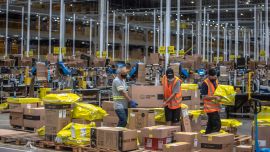In spite of the smiles and warm embraces at this week’s inauguration, Alberto Fernández’s first five days as president have served as a referendum on the politics of Mauricio Macri. He’s employed a rhetoric of rejection against nearly everything his predecessor stood for – not the least of which is his foreign policy ideology.
During Macri’s four years in office, he campaigned for the affection of the United States and other Western nations.
He opposed leftist leaders in Latin America, like Evo Morales in Bolivia and Nicolas Maduro in Venezuela; fostered relationships with US presidents Barack Obama and Donald Trump; deepened commercial ties with Brazil and helped redirect the Mercosur trade bloc; and preached messages of economic austerity and free trade that were music to the ears of many Western governments. But almost immediately after his defeat by his Peronist rival, Macri watched on as his foreign policy legacy was spun on its head.
Fernández made his intentions clear from the start. His first foreign trip as presidentelect was to Mexico and the country’s leftist president Andrés Manuel López Obrador. He fiercely defended Evo Morales after his resignation after a contested election, calling on Macri to offer asylum when the indigenous leader fled his home country — a promise he’s now made good on, after the Bolivian’s arrival in Buenos Aires on Thursday.
These decisions could “give the impression of an ideological foreign policy that could alienate allies in Washington and Europe,” said Benjamin Gedan, director of the Woodrow Wilson Center’s Argentina Project.
Moves like these echo the foreign policy stances taken by Cristina Fernández de Kirchner during her own two-term presidency, some experts speculate.
The new vice-president frequently lambasted Washington, cozied up to leftist leaders in Venezuela and Cuba and publicly condemned what she characterised as economic imperialism and interventionism in the region. As part of a Latin American progressive wave, she sought regional integration but took a hard isolationist line against governments outside that paradigm.
The potential re-emergence of that approach concerns analysts like Oliver Stuenkel, a professor of international relations at the respected Getúlio Vargas Foundation in São Paulo, who asserts that cooperation across ideologies is essential for the region.
“Unless South American countries work together, they can’t meaningfully address a series of challenges like deforestation, organised crime, and economic development because they need to integrate physically to do so,” he told the Times.
Many experts, however, say that the harsh economic reality facing Argentina today complicates an ideological approach. First, Argentina must attract foreign investment and trade to recuperate financial losses. Second, new Economy Minister Martín Guzmán’s desire to delay payments to the International Monetary Fund (IMF) requires favourable treatment from countries at the helm of the body, such as the United States. Both goals hinge upon effective diplomacy.
Gedan believes Argentina’s efforts to revive the economy will ultimately necessitate practicality, though he says the signals coming out of the Casa Rosada have been “mixed” thus far.
A number of indicators muddle confidence in the clarity of the president’s vision.
“We’re seeing this very battle pl ay out i n h i s C a bi ne t appointments,” said Andrei Serbin Pont, an international relations analyst and the director of the CRIES think-tank. “There are some, including the foreign minister, who are very close to Fernández and, I think, show that more pragmatic inclination. Others are more ideological like Cristina.”
GUEST LIST
Fernández said delegations from all countries were welcome to attend his inauguration ceremonies on Tuesday and the guestlist was closely watched.
President Miguel Díaz-Canel from Cuba was the first foreign dignitary to arrive. After laying a wreath at the Monumento al General San Martín, he later met with a group of businessmen and intellectuals and called for a “strengthening of relations” between Havana and Buenos Aires.
Perhaps the most alienating attendee though was Venezuela’s Jorge Rodíguez, a member of Maduro’s government who faces sanctions from the US and others in Latin America.
Fernández has refused to reject the validity of Maduro’s claim to rule, a stark departure from Macri who backed the opposition leader in Congress and self-declared interim president Juan Guaidó. While he hasn’t outright backed Maduro either, Fernández’s attendance at the Grupo de Puebla summit last month — a meeting of progressive Latin American leaders founded earlier in the summer as a counterpoint to the Grupo de Lima that seeks to remove Maduro from office — indicated where the Peronist leader’s policy is likely headed.
Mauricio Claver-Carone, the US presidential adviser for hemispheric affairs, flew to Buenos Aires but ultimately skipped the inauguration. He told Clarín he wasn’t told Rodriguez would be present, prompting him to also cancel a series of scheduled meetings.
Former Ecuadorean president Rafeael Correa also attended, which the Claver-Carone cited as another reason for skipping the main event.
Warmth with Washington may prove important – the US government provides more funds to the IMF than any other country, which means it holds a great deal of sway over Fernández’s potential to renegotiate terms on the US$57-billion loan, of which Argentina has received around US$44 billion to date.
REGIONAL DRAMA
Closer to home, there’s one relationship that’s already sparking tensions, though drama between Jair Bolsonaro and Argentina’s new head of state began long before October’s election. The Brazilian president was a strong backer of Macri during the campaign and chose to skip the diplomatic pleasantries after Fernández emerged victorious.
However, that fiery start has cooled into a more tepid state of affairs, with recent events indicating “there may be space to resume the relationship after those initial confrontations,” said Serbin Pont.
In the end, it was Vice-President Hamilton Mourão who flew in for the inauguration. Some speculate the Brazilian leader ceded to pressure after a series of diplomatic efforts – which included representatives from the Brazilian Congress flying to Buenos Aires and Fernández's appointment of former presidential hopeful Daniel Scioli as Argentina’s ambassador in Brasilia – suggested anxiety about disruption to the trade relationship. “Fernández appointed a very experienced, very respected person to the ambassador position in Brasilia, which is a clear sign that he wants this relationship with Brazil to work,” said Stuenkel.
As the two largest economies in the region, Brazil and Argentina serve as the “bedrock of all the geopolitical stability in the region,” he added.
That’s reason enough for Fernández to aim for a “pragmatic” approach, despite a “battle” going on with his “far more radical and more experienced” vice-president, said Stuenkel.
The weight of that relationship is especially profound when it comes to the Mercosur, the customs union and trade bloc of which Argentina, Brazil, Paraguay and Uruguay are members. Stuenkel sees changes afoot. “I predict that Mercosur will cease being a customs union with a common tariff and will instead become a free-trade area so that Brazil can negotiate on its own,” he said. “That is a very dramatic process.”
ROAD AHEAD
Among the developments raising questions from the new occupants of the Casa Rosada has been the appointment of Felipe Solá as foreign minister. The 69-year-old former agricultural minister under Carlos Menem is a political veteran, but he has little diplomatic experience.
“Solá is not known for his foreign policy positions, so it remains to be seen how he’s going to shape Alberto Fernández’s global government,” said Gedan.
According to Serbin Pont, Solá’s historically close relationship with Fernández suggests he will represent the more measured side of Argentina’s future international posture.
It was the foreign minister who announced that Evo Morales had landed in Argentina on Thursday. Solá told reporters Morales will be given refugee status by Fernández’s new government, an offer that was extended before the president took office.
Perhaps in an effort to emphasise the administration’s moderation, Solá added that Morales’ stay came with “ a series of guidelines, such as a place of residence, etc.” and a commitment from Morales “not to make political declarations in Argentina,” he told La Nación.
Thus far, Solá has also said Argentina will remain in the Grupo de Lima, despite Fernández’s alignment with the Grupo de Puebla.
For now, the new government seems keen on keeping all lines of communication open. Despite Claver-Carone’s no-show, Fernández did meet this week with Trump’s Acting Assistant Secretary for Western Hemisphere Affairs Michael Kozak.
Solá, meanwhile, met with Baroness Gloria Hooper, a member of Britain’s House of Lords and the president of a parliamentary on Latin America, on Wednesday, less than a day after Fernández had reiterated Argentina’s sovereignty claim to the Malvinas (Falkland) Islands in his inauguration.
Under Fernández, experts predict we’ll see a concerted effort at creating “balance” between the importance of international ties and internal demands.
“The interest will be in trying to balance multiple relations — regional actors, the US and China, especially — and not wanting to antagonise them,” Serbin Pont said. “Though, at times, positions of confrontation, with the US, for example, could actually be in Fernández’s interests, especially due to internal pressures.”






















Comments